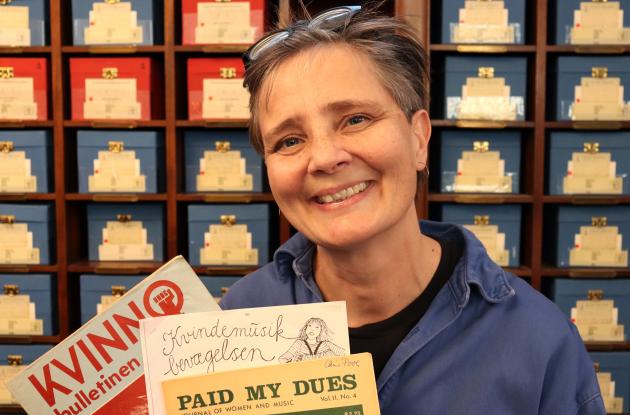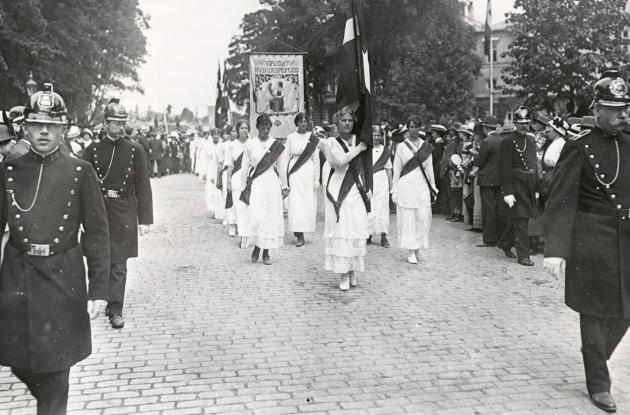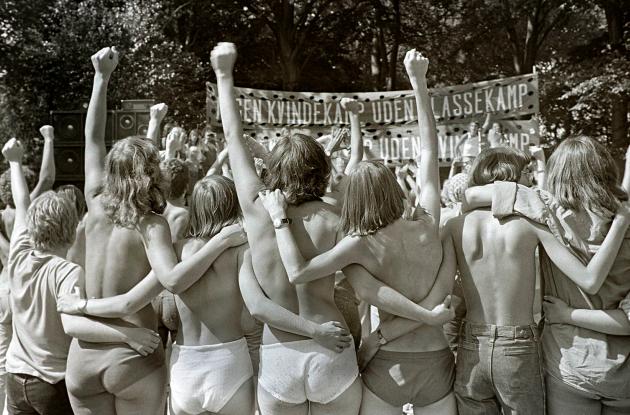Music history, know your women!
Meet Royal Danish Library's researcher Katrine Wallevik, who is currently working with the archive of the association "Women in Music". Her work aims to shine a spotlight on female artists.

Photo: Det Kgl. Bibliotek
Published 07 March 2025 | Revision 24 March 2025
Since the turn of the year, musicologist Katrine Wallevik has been part of Special Collections at Royal Danish Library. For the next two years, she will be researching the "Women in Music" archive, which has been part of the collections since 2024. On the occasion of International Women's Day, we spoke to Katrine about her research and why it is important to be aware of the blind spots of history:
It's no secret that the vast majority of leading Danish composers and songwriters have been men. This is reflected in our collections, but have you come across any material that tells a different story?
It is actually very concrete when we look at the images from the archive of the association "Women in Music", which has now been transferred to Royal Danish Library. The archive, which has been collected over 40 years by music librarian Tove Krag and music researcher Inge Bruland, contains a large amount of unique sound recordings, composer lists, articles and much more. At the moment, it is all in boxes and waiting to be unpacked.
It is a physical representation of the blind spots we see in music history. And that was precisely the purpose of the collection - to support documentation and research that sheds light on women's creative work within the various fields and eras of music, regardless of the fact that they did not have the same good conditions as men. It is important to acknowledge that there have been many female composers and performers who have historically been overlooked.
Why is it important to focus on female sound artists right now?
We are seeing a growing interest in exploring and acknowledging women's contributions to history, not only in music, but also in literature and other fields. Books like Gry Jexen's "Kvinde kend din historie" (Woman Know Your History) and Eva Tind's "Kvinden der samlede verden" (The Woman Who Brought the World Together) have all contributed to this wave. They point out how history writing has often overlooked significant contributions from women and gender minorities. Music history is no exception, and it is time we start to correct these biases.
What is the significance of it now being a part of Royal Danish Library?
Once unpacked and catalogued, the archive will be accessible to all and will thus provide a new dimension to our understanding of music history. This will hopefully help to correct the blind spots of music history and give historians, students and music enthusiasts the opportunity to delve into a rich source of the work of female artists. Once accessible, the archive will be a fantastic resource for anyone who wants to learn more about women's contributions to Danish music history.
I hope people will open their eyes to the many amazing female artists who have contributed to music throughout history. Improving gender equality when telling history is not just the responsibility of women; it is a task for all of us. Music history needs to know its women.
Women's movement
Learn more about women's movement in our themes on the subject.
Women's struggle for citizenship

Rødstrømper – sisterhood and revolution
